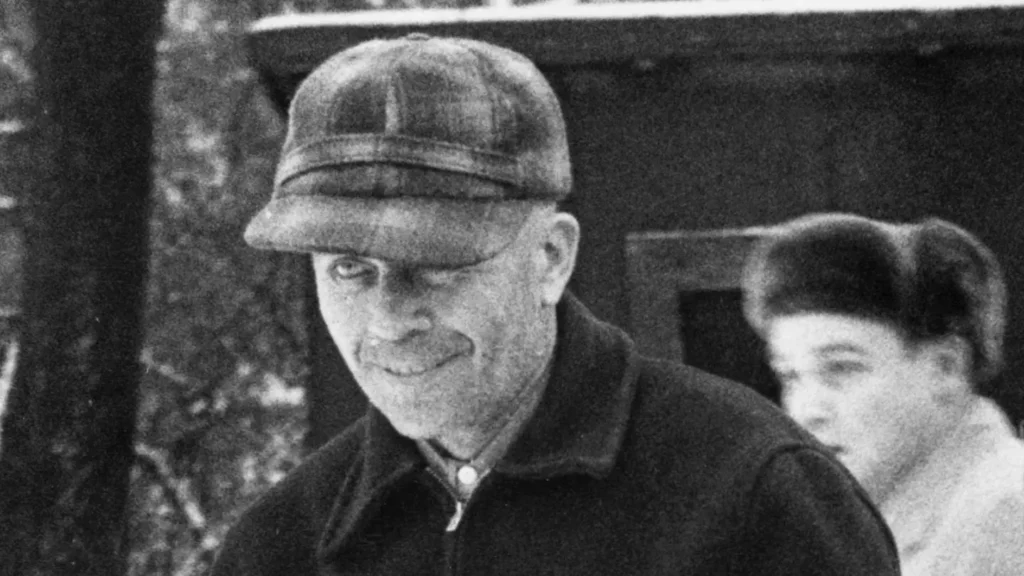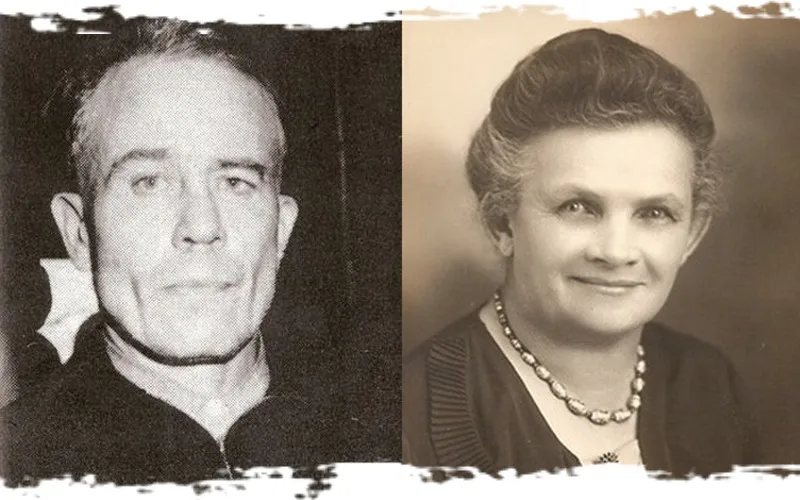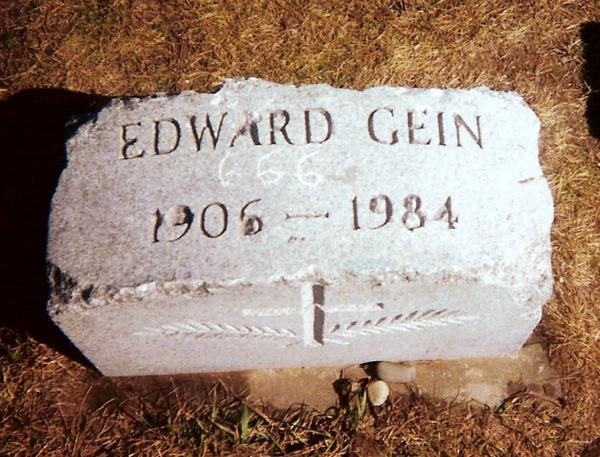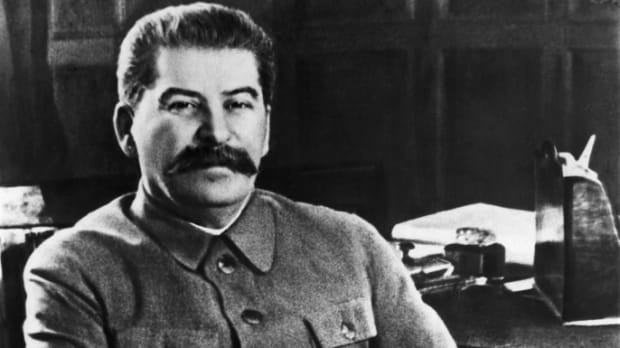Every society in the world has taboo practices, things that immediately cast you as a social outcast or criminal deviant if you do them. In the United States, this includes myriad sexual acts that deviate from the norm of heterosexuality.
While homosexuality has become more widely accepted in recent years, there are still numerous behaviors that are unacceptable in American society, with mutilation of dead bodies considered one of the worst. This act is considered blasphemy by many and transgresses not only social norms but also many religious ones.
But Ed Gein, a psychopath in the 1950s, did not care about social norms. He left a disturbing setting filled with the body parts of others after his capture.

Early Life
Born in 1906 in La Crosse, Wisconsin, Gein was the second of two sons to George and Augusta Gein. His father was an alcoholic who was consistently unable to hold down a job. He owned a small grocery store while the family lived in La Crosse.
But early in Gein’s life, his father sold the store and the family moved into the rural fields surrounding La Crosse, to a town called Plainfield. George then spent the rest of his life moving from job to job, reinforcing his wife’s perception that he was a useless alcoholic.
He died in 1940 of heart failure, related to his alcoholism. He left his two sons, now in their 30s, alone with their mother.
Gein did not mind this new world, however. Augusta was his best friend and the most cherished person in his life, the result of a lifetime of abuse and manipulation.
Augusta was a fervent Lutheran who believed that the world was an awful, sinful place. She believed that all men were violent alcoholics, and that all women were sexual demons who were the root of evil in the world.
When her first son, Henry, was born, she was distraught. She became miserable in a life surrounded by men and convinced herself that having a daughter would resolve her problems and restore meaning to her life.
At the end of her second pregnancy though, she once again bore a son and swore that she would raise young Edward to not be like other men; a promise that she would unfortunately keep.
A Turbulent Upbringing
Gein was raised within the iron grip of his mother. He developed a distorted view of the world from the family’s isolated farm in Plainfield.
Augusta would read passages from the Bible to the children daily. She typically focused on the threatening or macabre stories that left the boys fearing divine retribution for their sins.
She also isolated the children to the best of her ability, only sending them to school because it was the law. Any time young Gein tried to make friends though, Augusta forbade it. She would punish him, so he learned to not seek out any kind of companionship.

This meant many of the people he met, such as his teachers, saw Gein as a bit odd and socially underdeveloped. However, he did well in school and was able to communicate with those around him well enough.
Compounding on his social isolation, Gein was also a victim of Augusta’s twisted sense of the world. Since she did not give birth to a daughter, she decided to instead raise Gein as close to a daughter as she could.
She forbade the young boys not only from friendships but also any kind of “sinful activity,” which included any kind of sexual feeling. This repression of sexuality would define Gein’s life.
Early in life he established a strong attraction to women after seeing his mother slice open a pig during slaughter. Once he saw how powerful women could be, he was strongly attracted to women but could do nothing to act on it without committing what his mother deemed a sin.
This was an internal conflict that would drive his psychopathy for years.
Augusta’s method of raising Gein left young Ed as a very quiet, passive, and emotional young boy who was forced to reconcile his developmental needs with the distorted social standards his mother enforced. As a result of his isolation and despite the abuse, Gein became obsessed with his mother.
He remained fiercely loyal to her throughout her life, developing an unhealthy emotional attachment to her that psychologists would later analyze for decades.
An Unhealthy Connection and First Brush with Death
After their father passed, Ed and Henry had to support the family and took on assorted jobs. Ed typically got along well with children since he was underdeveloped socially, so he excelled at babysitting roles.
As they got older though, Henry began to critique their mother. He met a woman. Once he planned to move in with her, he began making disdainful comments about their mother to Ed.
Ed was shocked and hurt, unable to imagine betraying their mother or her vision of the world for them. Shortly after, Henry was found dead in a field on the family farm.
Ed had spent the day lighting the brush on fire in a nearby marsh to clear it. This quickly got out of hand and required the local firefighters to assist in putting it out.
It was after the fires were extinguished that Ed reported his brother missing. A search party with flashlights found his dead body in one of the fields that night.
Although the investigation would rule that Henry died of heart issues, it has been hypothesized that Ed may have punished his brother for questioning and insulting their mother. This may have been the beginning of his descent into madness.
Police Discover Ed’s Secret
Shortly after, Augusta suffered a paralyzing stroke that left her nearly helpless, so Ed dedicated his life to taking care of her for just over a year. Even as he waited on her hand and foot, catering to her every need, Augusta was not grateful towards Ed.
She continued to belittle him, insisting he would turn out to be useless like his father. On the rare occasions she had the energy to leave the farm, she raged against what she deemed the sinful acts of others. When she passed in December of 1945, she left Ed alone with no family or friends, a broken psyche, and a twisted view of the world.
For over a decade after his mother’s death, Ed would spiral into a pattern of psychopathic behavior. He would not be discovered until 1957 when police investigated the disappearance of Bernice Worden.
Gein was suspected in her disappearance. When police entered his home, they were met with a gruesome scene.
Except for the two rooms where Augusta had spent most of her time while alive, which Ed had boarded off as shrines to her, the house was filled with assorted body parts, bones, and skin from dead bodies.
After he was taken in for questioning, it was discovered that Ed had made over forty trips to local cemeteries over the past decade. While in a dissociative state, Ed would locate bodies of recently buried women who resembled his mother and he would steal parts of their bodies to keep in his home.
He used these women’s skin as upholstery for his furniture or lampshades, as well as used it for crafting clothing. Ed even created a full-body suit which he would sometimes don while he danced in the fields as a way to feel like he was crawling inside of his mother and getting close to her again.
Ed’s Confession
When police first attempted to charge Ed with the murder of Worden, he pled not guilty by way of insanity. Psychologists deemed him unfit to testify. They sentenced him to stay in a hospital for the criminally insane, where he would spend the next decade of his life.
Although he had originally confessed to the crimes, the sheriff at the time was so distraught by Ed’s crimes that he assaulted Ed, deeming the confession inadmissible. But in 1968, Ed was deemed sane enough to stand trial and after one week of testifying.
He was found guilty of one count of murder. However, he was also ruled not guilty by insanity and spent the rest of his life in a mental hospital.
Gein died in 1984 of lung cancer, but his legacy lives on. He was interred in the same cemetery as his family, buried between his parents and brother.
His notoriety attracted visitors, however. They would chip chunks of his tombstone off until it vanished entirely in 2000 for over a year.

Since it was recovered in 2001 it has been held in storage at the Waushara County Sheriff’s Department. Gein would also inspire the creation of disturbed characters in media, such as Norman Bates in Psycho, Buffalo Bill in Silence of the Lambs, and Dr. Oliver Thredson in American Horror Story: Asylum.
References
Biography.com Editors and Tyler Piccotti. “Ed Gein.” Biography.com, November 27, 2023. https://www.biography.com/crime/ed-gein.
johnjenn. “Parenting Gone Wrong.” Lived Local Histories of Wisconsin, 2013. https://michaeljfaris.com/bgswisconsin/parenting-gone-wrong/.

